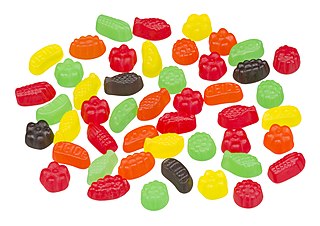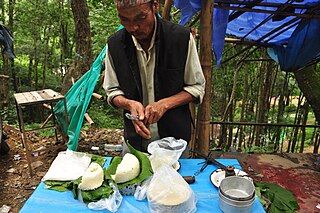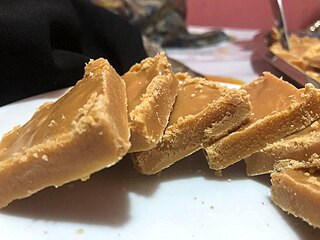
Confectionery is the art of making confections, or sweet foods. Confections are items that are rich in sugar and carbohydrates although exact definitions are difficult. In general, however, confections are divided into two broad and somewhat overlapping categories: bakers' confections and sugar confections.

Jelly Babies are a type of soft sugar jelly sweets in the shape of plump babies, sold in a variety of colours. They were first manufactured in Lancashire, England, in the nineteenth century. Their popularity waned before being revived by Bassett's of Sheffield in Yorkshire, who began mass-producing Jelly Babies in 1918.

Ovaltine is a brand of milk flavouring product made with malt extract, sugar, and whey. Some flavours also have cocoa. Ovaltine, a registered trademark of Associated British Foods, is made by Wander AG, a subsidiary of Twinings, which acquired the brand from Novartis in 2002, except in the United States, where Nestlé acquired the rights separately from Novartis in the late 2000s.

Shortbread or shortie is a traditional Scottish biscuit usually made from one part white sugar, two parts butter and three to four parts plain wheat flour. Shortbread does not contain any leavening, such as baking powder or baking soda. Shortbread is widely associated with Christmas and Hogmanay festivities in Scotland, and some Scottish brands are exported around the world.

Wagashi is traditional Japanese confectionery, typically made using plant-based ingredients and with an emphasis on seasonality. Wagashi generally makes use of cooking methods that pre-date Western influence in Japan. It is often served with green tea.

Jujyfruits are a chewy, gumdrop-like starch-based candy, manufactured by Heide Candy Company, a subsidiary of Ferrara Candy Company. Jujyfruits began production in 1920. They were popular in movie houses along with Heide's other gummy candy, Jujubes.

Jalebi is a popular sweet snack in the Indian subcontinent, West Asia and some parts of Africa. It goes by many names, including jilapi, zelepi, jilebi, jilipi, zulbia, jerry, mushabak, z'labia, or zalabia.

Captain Midnight is an American adventure franchise first broadcast as a radio serial from 1938 to 1949. The character's popularity throughout the 1940s and into the mid-1950s extended to serial films (1942), a television show (1954–1956), a syndicated newspaper strip, and a comic book title (1942–1948).

Liquorice allsorts are assorted liquorice confectionery sold as a mixture. Made of liquorice, sugar, coconut, aniseed jelly, fruit flavourings, and gelatine, they were first produced in Sheffield, England, by Geo. Bassett & Co Ltd.

Wine gums, commonly known as gummies, are chewy, firm pastille-type sweets originating from the United Kingdom. All brands have their own recipes containing various sweeteners, flavourings and colourings. Wine gums are popular in the United Kingdom, Canada, Ireland, South Africa and many Commonwealth nations, as well as several European countries. Common brands include Maynards, Bassett's, Haribo and Lion.

Liquorice or licorice is a confection usually flavoured and coloured black with the extract of the roots of the liquorice plant Glycyrrhiza glabra.

Mysore pak is an Indian sweet prepared in ghee. It originated in the city of Mysore, one of the major cities in the Indian state of Karnataka. It is made of generous amounts of ghee, sugar, gram flour, and often cardamom. The texture of this sweet is similar to a buttery and dense cookie. It is also popular in the neighboring countries Pakistan and Bangladesh.
Mithai (sweets) are the confectionery and desserts of the Indian subcontinent. Thousands of dedicated shops in India, Bangladesh, Nepal, Pakistan and Sri Lanka sell nothing but sweets.

Khoa, khoya, khowa or mawa is a dairy food widely used in the cuisines of the Indian subcontinent, encompassing India, Nepal, Bangladesh, Punjab, and Pakistan. It is made of either dried whole milk or milk thickened by heating in an open iron pan. It is lower in moisture than typical fresh cheeses such as ricotta. It is made up of whole milk instead of whey.

Spoon sweets are sweet preserves, served in a spoon as a gesture of hospitality in Bosnia, Serbia, Albania, Greece, Turkey, Kosovo, Cyprus, the Balkans, parts of the Middle East, and Russia. They can be made from almost any fruit, though sour and bitter fruits are especially prized. There are also spoon sweets produced without fruit.

Kozhukatta, Kozhukkattai or Kudumu is a popular South Indian dumpling made from rice flour, with a filling of grated coconut, jaggery, or chakkavaratti. Kozhukatta, although usually sweet, can sometimes be stuffed with a savory filling. Modak is a similar dish made in other parts of India.

Gummies, gummi candies, gummy candies, or jelly sweets are a broad category of gelatin-based chewable sweets. Gummy bears, Sour Patch Kids, and Jelly Babies are widely popular and are a well-known part of the sweets industry. Gummies are available in a wide variety of shapes, most commonly seen as colorful depictions of living things such as bears, babies, or worms. Various brands such as Bassett's, Haribo, Albanese, Betty Crocker, Hersheys, Disney and Kellogg's manufacture various forms of gummy snacks, often targeted at young children. The name "gummi" originated in Germany, with the terms "jelly sweets" or "gums" more common in the United Kingdom.

Imqaret are traditional Maltese sweets made with pastry and a filling of dates. The word imqaret in Maltese, is the plural of maqrut (diamond-shaped) and it signifies the diamond shape of the sweets – even though in many cases they are sold in a rectangular shape. They are very popular in Malta and they are sold in street markets, as well as in village feasts, in some cases served with ice-cream.

Roman cuisine comes from the Italian city of Rome. It features fresh, seasonal and simply-prepared ingredients from the Roman Campagna. These include peas, globe artichokes and fava beans, shellfish, milk-fed lamb and goat, and cheeses such as pecorino romano and ricotta. Olive oil is used mostly to dress raw vegetables, while strutto and fat from prosciutto are preferred for frying. The most popular sweets in Rome are small individual pastries called pasticcini, gelato and handmade chocolates and candies. Special dishes are often reserved for different days of the week; for example, gnocchi is eaten on Thursdays, baccalà on Fridays and trippa on Saturdays.

Kiri Aluwa, also known as milk toffee or kiri toffee, is a popular traditional Sri Lankan soft toffee.


















